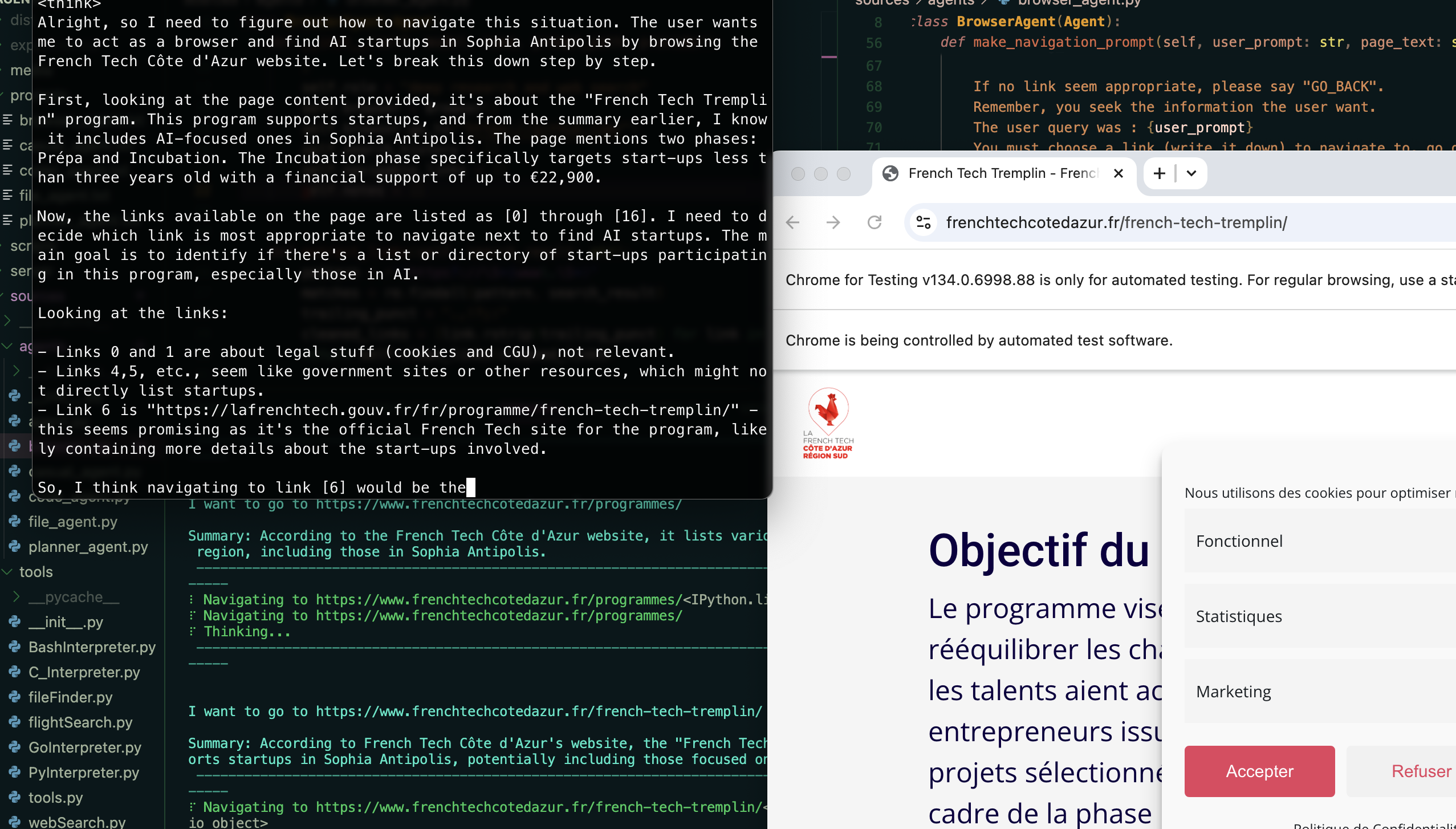AgenticSeek: Manus-like AI powered by Deepseek R1 Agents.
A fully local alternative to Manus AI, a voice-enabled AI assistant that codes, explores your filesystem, browse the web and correct it's mistakes all without sending a byte of data to the cloud. Built with reasoning models like DeepSeek R1, this autonomous agent runs entirely on your hardware, keeping your data private.
🛠️ Work in Progress – Looking for contributors!
Features:
-
100% Local: No cloud, runs on your hardware. Your data stays yours.
-
Voice interaction: Voice-enabled natural interaction.
-
Filesystem interaction: Use bash to navigate and manipulate your files effortlessly.
-
Code what you ask: Can write, debug, and run code in Python, C, Golang and more languages on the way.
-
Autonomous: If a command flops or code breaks, it retries and fixes it by itself.
-
Agent routing: Automatically picks the right agent for the job.
-
Divide and Conquer: For big tasks, spins up multiple agents to plan and execute.
-
Tool-Equipped: From basic search to flight APIs and file exploration, every agent has it's own tools.
-
Memory: Remembers what’s useful, your preferences and past sessions conversation.
-
Web Browsing: Autonomous web navigation is underway.
Searching the web with agenticSeek :
See media/examples for other use case screenshots.
Installation
1️⃣ Clone the repository
git clone https://github.com/Fosowl/agenticSeek.git
cd agenticSeek
2️ Create a virtual env
python3 -m venv agentic_seek_env
source agentic_seek_env/bin/activate
# On Windows: agentic_seek_env\Scripts\activate
3️⃣ Install package
Automatic Installation:
./install.sh
Manually:
pip3 install -r requirements.txt
# or
python3 setup.py install
Run locally on your machine
We recommend using at least Deepseek 14B, smaller models struggle with tool use and forget quickly the context.
1️⃣ Download Models
Make sure you have Ollama installed.
Download the deepseek-r1:7b model from DeepSeek
ollama pull deepseek-r1:7b
2️ Run the Assistant (Ollama)
Start the ollama server
ollama serve
Change the config.ini file to set the provider_name to ollama and provider_model to deepseek-r1:7b
NOTE: deepseek-r1:7bis an example, use a bigger model if your hardware allow it.
[MAIN]
is_local = True
provider_name = ollama
provider_model = deepseek-r1:7b
start all services :
./start_services.sh
Run the assistant:
python3 main.py
Run the LLM on your own server
If you have a powerful computer or a server that you can use, but you want to use it from your laptop you have the options to run the LLM on a remote server.
1️⃣ Set up and start the server scripts
On your "server" that will run the AI model, get the ip address
ip a | grep "inet " | grep -v 127.0.0.1 | awk '{print $2}' | cut -d/ -f1
Note: For Windows or macOS, use ipconfig or ifconfig respectively to find the IP address.
Clone the repository and then, run the script stream_llm.py in server/
python3 server_ollama.py
2️⃣ Run it
Now on your personal computer:
Clone the repository.
Change the config.ini file to set the provider_name to server and provider_model to deepseek-r1:7b.
Set the provider_server_address to the ip address of the machine that will run the model.
[MAIN]
is_local = False
provider_name = server
provider_model = deepseek-r1:14b
provider_server_address = x.x.x.x:5000
Run the assistant:
./start_services.sh
python3 main.py
Run with an API
Clone the repository.
Set the desired provider in the config.ini
[MAIN]
is_local = False
provider_name = openai
provider_model = gpt4-o
provider_server_address = 127.0.0.1:5000 # can be set to anything, not used
Run the assistant:
./start_services.sh
python3 main.py
Providers
The table below show the available providers:
| Provider | Local? | Description |
|---|---|---|
| Ollama | Yes | Run LLMs locally with ease using ollama as a LLM provider |
| Server | Yes | Host the model on another machine, run your local machine |
| OpenAI | No | Use ChatGPT API (non-private) |
| Deepseek | No | Deepseek API (non-private) |
| HuggingFace | No | Hugging-Face API (non-private) |
To select a provider change the config.ini:
is_local = False
provider_name = openai
provider_model = gpt-4o
provider_server_address = 127.0.0.1:5000
is_local: should be True for any locally running LLM, otherwise False.
provider_name: Select the provider to use by its name, see the provider list above.
provider_model: Set the model to use by the agent.
provider_server_address: can be set to anything if you are not using the server provider.
FAQ
Q: What hardware do I need?
7B Model: GPU with 8GB VRAM. 14B Model: 12GB GPU (e.g., RTX 3060). 32B Model: 24GB+ VRAM.
Q: Why Deepseek R1 over other models?
Deepseek R1 excels at reasoning and tool use for its size. We think it’s a solid fit for our needs other models work fine, but Deepseek is our primary pick.
Q: I get an error running main.py. What do I do?
Ensure Ollama is running (ollama serve), your config.ini matches your provider, and dependencies are installed. If none work feel free to raise an issue.
Q: How to join the discord ?
Ask in the Community section for an invite.
Q: Can it really run 100% locally?
Yes with Ollama or Server providers, all speech to text, LLM and text to speech model run locally. Non-local options (OpenAI or others API) are optional.
Q: How come it is older than manus ?
we started this a fun side project to make a fully local, Jarvis-like AI. However, with the rise of Manus, we saw the opportunity to redirected some tasks to make yet another alternative.
Q: How is it better than manus ?
It's not but we prioritizes local execution and privacy over cloud based approach. It’s a fun, accessible alternative!
Contribute
We’re looking for developers to improve AgenticSeek! Check out open issues or discussion.




